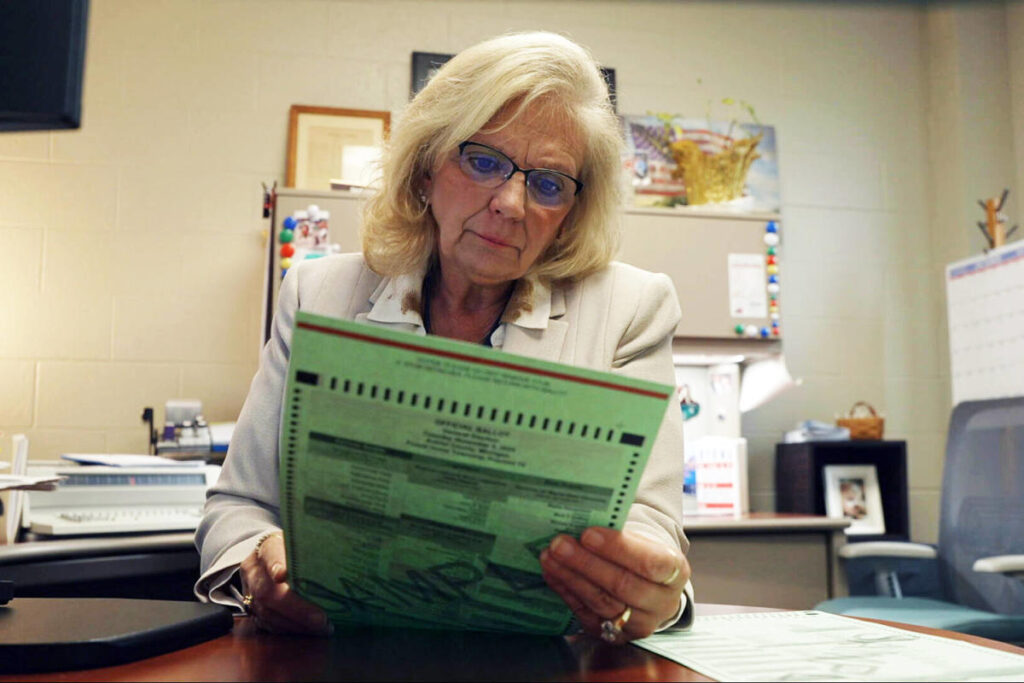In Antrim County, Michigan, Sheryl Guy, a long-serving county clerk, faces a tumultuous political climate after becoming embroiled in controversies surrounding the 2020 presidential election. Once planning to retire after the 2024 elections, Guy’s commitment changed when she realized that her potential successor, Victoria Bishop, was an election denier. With a background that includes over four decades in county service, Guy expressed her concerns about the integrity of the electoral process amid rising claims of election fraud, particularly as the notion that the 2020 election was stolen gains traction among certain political groups. The emergence of a write-in campaign led by Guy highlights her desire to ensure trustworthy electoral practices in an increasingly divided electorate.
Antrim County, despite its small size and picturesque landscape, became a pivotal point of contention during the 2020 election due to initial miscalculations in vote counts, which erroneously showed Joe Biden leading over Donald Trump in a traditionally Republican stronghold. Guy and her team worked tirelessly to rectify the counting error caused by human mistakes in tabulation, an issue later exploited by Trump and his supporters to fuel claims of widespread electoral fraud. The fallout from the incident left Guy feeling betrayed, as accusations of rigging the election created a hostile environment, cultivating death threats against her and undermining her credibility as an election official.
Driven by a deep sense of integrity and a commitment to her community, Guy decided to mount a write-in campaign against Bishop, who she believes poses a risk to electoral integrity. Bishop’s campaign has been characterized by her promotion of restoring what she claims is the compromised integrity of Antrim County elections, echoing themes common in the broader rhetoric surrounding contemporary electoral debates in America. Fellow supporters of Bishop, such as former Republican Party chair Tom Stillings, continue to foster doubts about the legitimacy of the 2020 election results, despite a lack of substantial evidence. This atmosphere of skepticism showcases the escalating clash between traditional democratic processes and the erosion of trust propagated by partisan viewpoints.
Guy actively acknowledges her past mistakes during the 2020 election, recognizing the weight they carry on her legacy and her sense of responsibility to her community. She emphasized the implementation of more stringent safeguards to prevent any potential missteps in future elections. Her candid acknowledgment of her prior errors stands in stark contrast to the vehement, often unfounded claims made by election deniers who assert widespread fraud without substantive evidence. This morally charged battleground in Antrim County introduces a compelling narrative surrounding election integrity, where public confidence in electoral results hangs in the balance.
The fight for election integrity in Antrim County reflects broader implications for democracy in the United States, as the episode encapsulates the ongoing struggle against the politicization of elections and the challenges posed by misinformation. Guy laments how simple skepticism, intended as a mechanism of accountability, can devolve into unfounded accusations that threaten the foundation of democratic processes. Her passionate defense of accurate and fair elections highlights pressing concerns about how perceptions of rigged systems could incite divisions among constituents and undermine the social contract that holds democratic systems together.
Ultimately, as Sheryl Guy seeks to reclaim her role and instill trust in the electoral process, she embodies the struggle for integrity amidst a national crisis of confidence in democratic institutions. Guy calls for respect among political figures, urging them to uphold the sanctity of the electoral process rather than exploit it for personal or partisan gain. Her grassroots campaign is not merely about winning an election; it is a call to restore faith in democracy in a landscape fraught with contradictions where the narrative of truth and lies continues to evolve. In Antrim County, the stakes are emblematic of a larger national discourse on the struggles to maintain a fact-based political dialogue amidst growing polarization.

